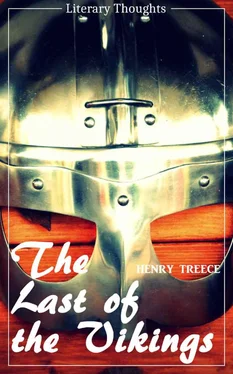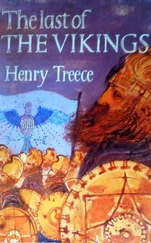The voice said, 'It ill becomes a man, though he be a king, to weave the future's web with boastful words. No man should speak of dinner till the sword is put away and the cup is at his lips. Here, close by York and beside this river called the Derwent, you should remember other words I spoke to you, once when you lay asleep in a burned ship on the plains above Kiev. But, more than that, you should remember Stiklestad, above Trondheim, when we thought we had the beating of Swein of Denmark. Do you remember Stiklestad, Brother Harald?'
The King of Norway nodded and rubbed his eyes as though they were full of sleep and he was trying to be rid of it. None of the carles seemed to notice this, or to hear dead Olaf's voice. It was more like a dream than anything else, and only Harald was in this dream. He gazed upwards, under the flapping banner, and said aloud, 'Aye, Olaf, I remember Stiklestad. It was the first battle I was ever in, and I was only a lad. I should remember it—enough happened that day to stay with me all my life. I have good cause to remember it, Olaf. Yes, every second of it, every blow of it!'
CHAPTER 1 – The Spears of Stiklestad
At Stiklestad six spears came at Harald, swift as snakes, rattling against each other, ash against ash, in haste to end him. He stumbled on the churned-up turf and fell, the spear-shafts criss-crossing over him like the roof-beams of a house, their iron points in the ground on either side of his body.
'Olaf! Brother Olaf!' he shouted, swinging his round shield sideways and flailing out as well as he could with his sword. To the rescue, Olaf, I am down!' His young voice echoed among the rocks, high and shrill.
He heard the rebel-peasants laughing above him, and one of them saying, 'You can cry out for the King, wolf-cub, but he's too busy to help you now!'
Suddenly Harald Sigurdson felt a great fury come over him, and rejoiced when his shield-rim cracked hard against the man's shin-bone, sending him skipping away and groaning.
Then the spear-points came out of the ground with a sucking noise, and Harald knew that soon they would be thrusting at him again, but more carefully now, having missed the first time.
In the little grace allowed him, he rose to his knees and swept out widely, like a man scything grass. He felt the edge of his sword, Legbiter, shock against something, almost twisting from his grasp, and he heard a man shout in pain. Then he just had time to get the broad shield over his head before the iron-points rattled on it furiously again.
He was about to take air into his lungs and call for Olaf once more, when there was a great thudding of feet and a rushing of air, and Harald found himself being lifted high, and being swept away, as though a whirlwind had clenched about his body to carry him up to Valhalla. As he struggled for a moment, he saw that his brother, Olaf of Norway, was close beside him, laughing and red-faced, scything with his long sword, and knocking men away from him as a lion would shake off dogs.
'Courage, brother!' the King was calling. 'We have got you now. We'll teach these carrion crows what it is like to fight with princes.'
Then Olaf's men had set Harald on his feet again, where the ground was more even and there were fewer enemies.
Olaf called back over his shoulder, 'Keep at it, little gamecock. I go to look for our enemy, the Danish king!'
Harald saw his half-brother plunging away like a giant among the brambles, his feet sinking into the sandy soil as he went, and his great cloak flying. Olaf was a fine man, a head taller than most in Norway, his hair almost as white as flax, his shoulders as broad as a barn-door.
'Let me come with you, brother!' the boy called.
But an old warrior dragged at his mail-shirt and said hoarsely in his ear, 'Hold the hill, Harald! You can serve him best here. Why do you think he has brought you to this place?'
Harald looked back at the old man, a bitter answer forming on his lips; but then he saw the smile on the wrinkled, battle-scarred face, and the great slashes in the man's mail-shirt, where his leather tunic showed through. And he said breathlessly, 'Yours is good counsel, Earl Rognvald. I thank you for reminding me of my duty.'
The Earl pulled Harald to one side, so that their house-carles could get round them in a shield-ring. Then he said, 'My own sons were like you, lad, rough unbroken stallions, before they fell under the Danish axe. At fifteen, you are a day too young for such an end. Keep with me, and we shall put an end to these rebel-peasants and their Danish allies, if God will only smile on us a while.'
Harald wiped the streaming sweat from his forehead and said, 'If He does, then one day, when the crown comes to me, Rognvald, I will build a great church for Him, down there at Trondheim. I call you to witness my promise.'
Earl Rognvald nodded and smiled. 'Aye, aye, lad,' he answered, 'I hear you, and I'll keep you to it, when the time comes. Now pull your helmet well down and tighten your throat-mail. Never leave the buckles unfastened. The arrows are flying, and it would be a bad bargain for Olaf to drag you away from the spears to lose you a minute later to the arrows.'
It was starting to rain, on the hill above the dark fiord, and the clouds were sweeping in, low and grey, from the sea, bringing with them hosts of white sea-birds which squawked harshly as they wheeled above the fighting men, as though mocking them.
From time to time arrows whistled out of the miserable sky and smacked viciously into the ground, sinking a hand's breadth before they stood, quivering, where they stuck.
Earl Rognvald called out for the carles to kneel and hold their bucklers above their heads for a while, until the arrow-flights had died off.
One great warrior shouted back, enjoying his taunt, 'What are our helmets for, Rognvald?'
The old Earl smiled bleakly at him and answered, 'Yours is of no use at all, Thorleif. Your skull itself is thick enough to turn any arrow I have seen; but I am thinking of your comrades, whose heads are less solid.'
The men all laughed at this and raised their shields as the Earl had said. Even Thorleif joined in the laughter, for it would have been unmanly not to take a joke against himself.
It was then that a tight-packed company of peasant Bonders came rushing from behind a clump of dark pine trees, and halting, shouted, 'Death to Olaf! We will have Swein of Denmark for our master, or none at all.'
Earl Rognvald poised his throwing-spear and answered them, 'You will have what you get, you treacherous dogs. And you can have this spear for a start!'
The long shaft whistled through the air towards the Bonder leader, who was running some paces ahead of his band. He was a black-haired man with the sharp eyes of a wolf, and so he saw the Earl's spear coming. No man could deny him courage, for he laughed even as the weapon plunged at him; then, in the last moment, leapt aside so that it only went through the skirt of his tunic.
'There are better spearmen than you, Rognvald,' he called.
But the Earl answered wryly, 'Look behind you, fellow, and see what it did to your brother.'
Then the Bonders were upon them, striking out with bill-hooks and scythe-blades, as well as with their long-hafted wood-axes. Some of these men felt the blood of battle beating so hard in their hearts that they flung themselves at the spear-hedge and tried to leap the points. But Harald's house-carles were old hands at this game. Many of them had faced even the fierce Moors of Andalusia in their time. Only one of the Bonders broke through towards the banner, and this one Harald cut down when he was but a yard away. It was the black-haired leader who had been so nimble and mocking a minute before.
Earl Rognvald spared him a glance and said, 'So, you see, lad, it ill becomes a cock to crow too loudly. Another fox may be waiting round the next corner of the barn.'
Читать дальше












